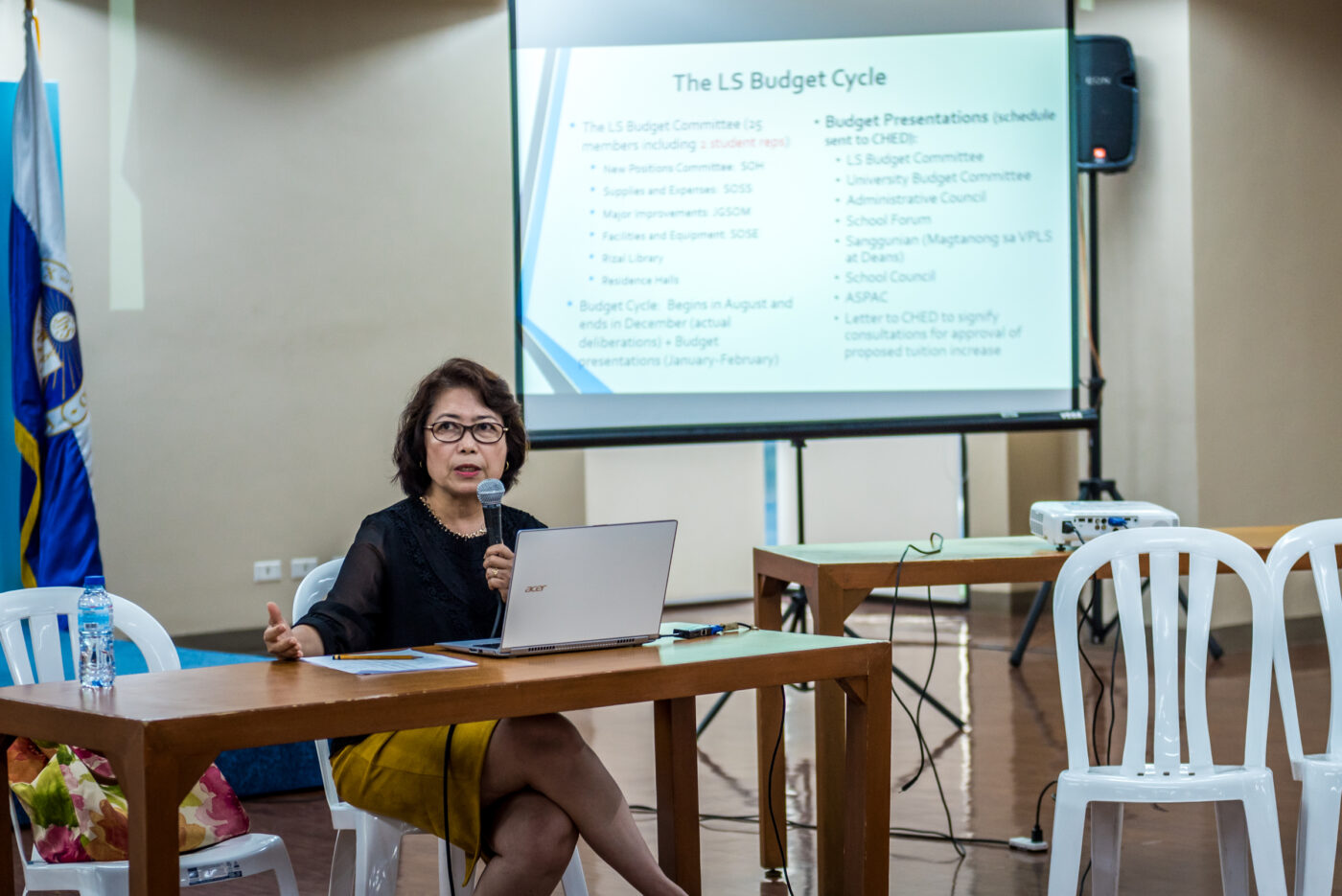THE LOYOLA Schools (LS) is on a slow recovery from the dip in enrollment, which is one of the reasons for the 6% tuition fee increase for school year (SY) 2017-2018, according to Vice President for the Loyola Schools (VPLS) Maria Luz Vilches, PhD.
Vilches consulted with LS deans, administrators, faculty, staff, and students on the formulation of the new budget in part one of Magtanong sa VP at mga Dekano held on August 14 at CTC 413.
The VPLS said that enrollment will not be stable until 2022, given the projected decrease in the number of students due to the implementation of the K-12 basic education curriculum.
LS fell short in enrollment for SY 2017-2018, with the total number of enrolled students at 7,459, or 141 less than the 7,600 expected enrollees.
Vilches also said that other than the enrollment dip, the tuition increase also accounts for 3% inflation and around 3% for salaries and benefits, therefore explaining the total of a 6% hike.
However, she said that the stabilization of enrollment in 2022 would not necessarily halt the annual tuition fee increase.
The forum also served as a dialogue between the LS community and representatives from the faculty and administration for recommendations on other student concerns.
After the first Magtanong forum comes the planning of the new LS budget, which is currently running from August until December.
The new, finalized budget will then be presented in the part two of the Magtanong forum on February 12, 2018.
LS Budget Cycle
The LS Budget Cycle consists of several steps. First, the VPLS sends out a memorandum to deans and departments to make their budget requests.
Deans are tasked to consolidate their respective proposed budgets, then the VPLS consolidates the submissions. The LS Budget Committee meets to look at the common protocols and meeting schedules. The sub-committees then meet to discuss the proposed budget requests.
The sub-committees include committees for agenda, curriculum, academic standards, discipline, and social involvement. These also involve student representatives.
After this, they present their recommendations to the LS Budget Committee. In these presentations, vetting takes place in the form of feedback and discussions. The LS budget is finalized and shown to the University in a series of presentations, where further discussions and vetting are done.
‘Major Improvement Projects’
The forum also tackled the Major Improvement Projects planned for SY 2017-2018. A total of Php 30 million from the students’ Facilities and Maintenance Fees which accumulated over the years, not from SY 2017-2018 tuition fees, are being used for these projects.
Vilches said that two chair lifts for Persons with Disabilities (PWDs) are being installed in the Berchmans and Kostka Halls. Kosta, Berchmans, Dela Costa Hall, and the Physical Education complex will all be repainted.
In addition, the following will all undergo rehabilitation under the projects initiated by the Office of Facilities and Sustainability (OFS): Restrooms in Kostka, Berchmans, and Bellarmine buildings; Quad 3 and Sec Field Irrigation System; the Rizal Mini Theater; Audio Visual Rooms in SOM; and the Red Brick Road from Faura to Schmitt Hall.
Other than the OFS-initiated projects, there are also a number of projects initiated by the Biology, Chemistry, Physical Education, Information Systems and Computer Science, and Electronics, Computer, and Communications Engineering Departments such as laboratory and facility improvements.
LS will also look again into miscellaneous fees in internships, and additional English units for those aspiring for law school, which were also brought up in the forum.
School reps weigh in
In an interview with The GUIDON, School of Social Sciences Representative Dasha Uy emphasized that the first concern of the Sanggunian regarding the 6% tuition increase is the number of students that will be affected.
“Our role will always be to protect the interest of the students and if that means really trying to lower or prevent a tuition increase, then we’ll really try to do that. But we also have to prepare for, hindi naman inevitabilities, [but] situations na baka hindi natin ma-stop,” she said.
(Our role will always be to protect the interest of the students and if that means really trying to lower or prevent a tuition increase, then we’ll really try to do that. But we also have to prepare for, not really inevitabilities, [but] situations we might not be able to stop.)
Meanwhile, John Gokongwei School of Management Representative Alec Lim said that more creative solutions can be proposed to help curb the tuition fee increase.
He mentioned how Ateneo organizations that hold events for high school students, such as the National Youth Development Congress by the Development Society of the Ateneo, actually help in bringing in revenue by encouraging more students to enroll in the school.
“So ‘yung mga ganung small stuff and creative stuff na you don’t really think about [help]. The challenge to students or organizations is to think of stuff like this so they’ll be able to help the administration,” he said.
Asked about how future Magtanong forums can be made more relevant to the student body, Uy said that a “culture of asking questions” should be encouraged among the students.
“If you have a concern, we try our best to bring it up to an admin level to change things. All you really have to do is ask about it,” she said.
Moreover, Lim said that widening the issues tackled would help in getting more students to come to future Magtanong forums.
“Right now, I feel like it’s a bit limited in the way that it was really focused on budget pero moving forward maybe Magtanong we can focus on more sensitive matters and admin can tackle it,” he said.







